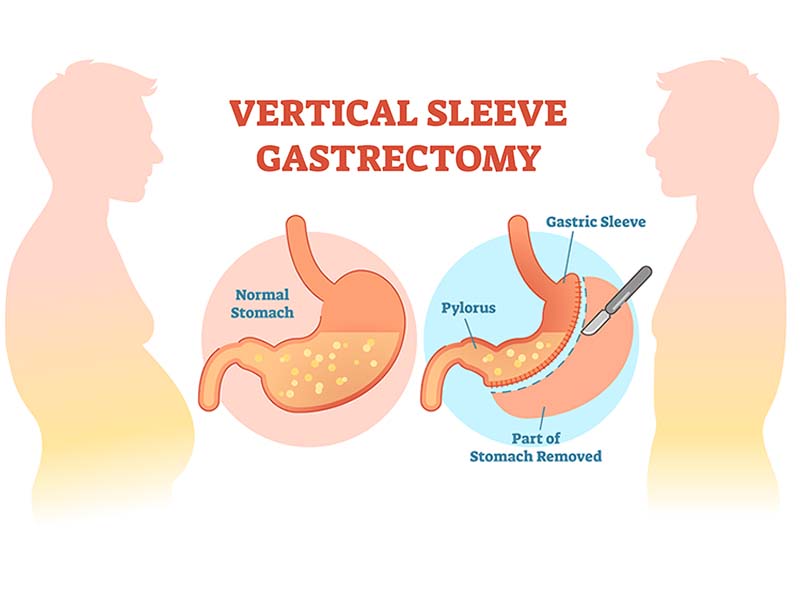Gastric sleeve surgery is a life-changing procedure that can significantly aid in weight loss and improve your health. However, the success of the surgery isn’t only about the procedure itself but also heavily depends on your post-operative habits. In this article, we’ll explore the common bad habits that can hinder your progress and how to avoid them.
Gastric sleeve Turkey surgery reduces the size of your stomach, limiting the amount of food you can eat and helping you feel full sooner. This alteration requires significant changes to your eating and lifestyle habits to ensure lasting weight loss and health benefits.
The Need for Post-Surgical Lifestyle Changes
Adapting new, healthier habits post-surgery is crucial. Many patients face challenges in adjusting their lifestyles, but understanding these potential pitfalls can help you navigate them successfully.
- Bad Habit #1: Neglecting Dietary Guidelines
One of the most common mistakes is not following the dietary guidelines provided by your nutritionist. Eating too quickly, skipping meals, or not measuring portions can lead to weight gain, nutritional deficiencies, or discomfort.
- Bad Habit #2: Inadequate Fluid Intake
Dehydration is a serious risk after gastric sleeve surgery because your body’s ability to absorb fluids changes. It’s crucial to hydrate regularly and avoid beverages that can dehydrate you further, such as those containing caffeine or alcohol.
- Bad Habit #3: Poor Food Choices
Opting for foods high in calories but low in nutrients can sabotage your weight loss efforts and lead to health issues. It’s important to focus on nutrient-rich foods to meet your body’s needs.
- Bad Habit #4: Inconsistent Eating Patterns
Grazing all day or eating late at night can disrupt your digestion and lead to weight gain. Setting a consistent eating schedule helps regulate your appetite and improves metabolism.
- Bad Habit #5: Skipping Protein
Protein is essential after surgery to help maintain muscle mass and support recovery. Incorporating adequate protein into every meal is necessary for your dietary balance.
- Bad Habit #6: Not Taking Supplements
Due to the reduced food intake and changes in digestion, you may need supplements to avoid deficiencies. It’s crucial to adhere to your doctor’s recommendations regarding vitamins and minerals.
- Bad Habit #7: Inadequate Physical Activity
Exercise not only helps with weight loss but also improves your overall health. Starting with gentle activities and gradually increasing intensity can make physical activity a regular part of your life.
- Bad Habit #8: Ignoring Psychological Needs
Emotional eating and not addressing psychological well-being can hinder your recovery. Techniques for managing stress and emotional challenges should be part of your routine, and seeking professional help when needed is important.
- Bad Habit #9: Poor Follow-Up with Healthcare Providers
Regular medical check-ups ensure that any issues are caught early and that your recovery is on track. Skipping these appointments can lead to overlooked complications.
- Bad Habit #10: Smoking and Alcohol Consumption
Smoking and excessive alcohol consumption can severely affect your recovery and long-term health. Quitting these habits is critical.
Strategies to Avoid Common Pitfalls
Successfully navigating the recovery process after gastric sleeve surgery requires a multi-faceted approach, focusing not just on immediate dietary changes but also on long-term lifestyle adjustments. Here are some strategies to help you avoid common pitfalls:
- Meal Planning: This involves more than just deciding what to eat. It means scheduling meals at regular intervals to prevent hunger pangs and avoid the temptation of snacking on unhealthy foods. Planning also ensures that meals are balanced with the right amounts of proteins, carbohydrates, and fats, which are crucial for optimal nutrition post-surgery.
- Setting Achievable Goals: Short-term goals might include things like walking a certain number of steps each day or gradually increasing the variety of foods in your diet. Long-term goals could focus on reaching and maintaining your target weight or achieving specific health milestones such as lowering blood pressure or improving cholesterol levels. Setting realistic and achievable goals helps keep you motivated and on track.
- Building a Strong Support Network: Recovery can be significantly smoother when you have a support system in place. This network can include family members, friends, a dedicated healthcare team, and even support groups with fellow patients who understand what you are going through. These people can offer emotional encouragement, share experiences, and provide practical help during difficult times.
- Mindful Eating: This is about being present while eating — paying attention to the taste, textures, and smells of your food, and listening to your body’s hunger and fullness cues. Mindful eating can help you enjoy your meals without overeating, which is crucial in maintaining a reduced stomach size.
- Staying Informed: Education is a key component of post-surgical success. Stay informed about the nutritional aspects of your new diet, understand the physical changes that are occurring in your body, and keep up-to-date with new insights and strategies for maintaining weight loss. This can involve reading up on topics, attending seminars, or participating in discussions with your healthcare provider.
- Regular Monitoring: Keep a food diary to monitor what and how much you eat. This can help identify any unhealthy patterns or behaviors that need to be adjusted. Regular check-ins with your healthcare provider to review your nutritional status and overall health are also important.
- Flexibility in Approach: Recognize that your journey will have ups and downs. Being flexible in your approach means adjusting your strategies as your body changes and as you learn what works best for you. This might mean tweaking your diet, altering your physical activity plans, or finding new ways to manage stress.
By incorporating these strategies into your daily life, you can significantly improve your chances of a successful recovery and long-term health after your gastric sleeve surgery. Remember, the goal is not just to lose weight but to gain a healthier, more satisfying lifestyle.
The Role of Mindful Eating
Mindful eating involves being fully present during meals, which helps in recognizing hunger and fullness signals. This practice can greatly enhance your relationship with food.
Utilizing Technology and Resources
Leverage technology to track your nutrition, set reminders for medications, and stay active. There are numerous apps and online resources that can support your journey.
Adopting healthy habits after gastric sleeve surgery is essential for achieving and maintaining your weight loss goals. By understanding and avoiding these common pitfalls, you can enjoy a healthier and more fulfilling lifestyle.
If you’re ready to make positive changes in your life after gastric sleeve surgery, start today by committing to one healthy habit at a time. Remember, you’re not alone on this journey—seek support from healthcare providers, support groups, and educational resources to help you along the way.
Are you on your journey to recovery after gastric sleeve surgery and looking for expert guidance and support? Luna Clinic is here to help you every step of the way. Our team of dedicated professionals is committed to ensuring you achieve the best outcomes from your surgery, providing personalized care tailored to your unique needs.
At Luna Clinic, we understand the importance of proper post-operative care and are equipped to help you avoid the common pitfalls that can occur after gastric sleeve surgery. From dietary advice to psychological support and regular health check-ups, we offer a comprehensive range of services designed to keep you on track toward achieving your health and wellness goals.
Don’t wait to get the support you need to succeed. Contact Luna Clinic today to schedule a consultation and learn more about how our post-operative care programs can benefit you. Visit our website or call us directly to take the first step toward a healthier, happier you. Let us help you turn your new beginning into a lasting success.

